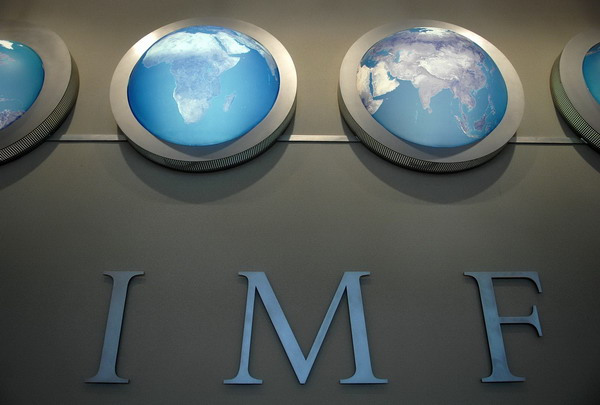Global Biz
IMF becomes latest known target of major cyber attack
(Agencies)
Updated: 2011-06-12 13:28
 |
Large Medium Small |
|
 The IMF nameplate is displayed at its headquarters during the World Bank/International Monetary Fund Spring Meetings in Washington in this April 11, 2008 file photo. The IMF has been hit by a cyber attack on its computer systems, an IMF spokesman said on June 11, 2011, highlighting a growing rash of network break-ins at high-profile institutions. [Photo/Agencies]
|
WASHINGTON/BOSTON - The International Monetary Fund, the intergovernmental group that oversees the global financial system and brings together 187 member nations, has become the latest known target of a significant cyber attack.
|
||||
Such a presence could yield a trove of non-public economic data used by the Fund to promote exchange rate stability, support balanced international trade and provide resources to remedy members' balance-of-payments crises.
"It was a targeted attack," said Tom Kellerman, who has worked for both international financial institutions and who serves on the board of a group known as the International Cyber Security Protection Alliance.
The code used in the IMF incident was developed specifically for the attack on the institution, said Kellerman, formerly responsible for cyber-intelligence within the World Bank's treasury team and now chief technology officer at AirPatrol, a cyber consultancy.
The attack on the IMF was the latest to become known in a rash of cyber break-ins that have targeted high-profile companies and institutions, often to steal secrets with potentially far-reaching economic implications. The list of victims includes Lockheed Martin Corp, Sony Corp and Citigroup Inc.
IMF spokesman David Hawley said Saturday the Fund was "fully functional," despite the attack.
"I can confirm that we are investigating an incident," he said, adding that he was not in a position to elaborate on the extent of it. He declined to respond to requests for comment on Kellerman's conclusion about the intruders' goal.
The US Federal Bureau of Investigation is helping to investigate the attack on the IMF, according to a US Defense Department spokeswoman.
Difficult to prove
A World Bank official said the Bank had cut its network connection with the IMF out of "caution" even though the information shared on that link was "non sensitive."
Rich Mills, a Bank spokesman, said "the World Bank Group, like any other large organization, is increasingly aware of potential threats to the security of our information system and we are constantly working to improve our defenses."
Jeff Moss, a self-described computer hacker and member of the Department of Homeland Security Advisory Committee, said he believed the attack was conducted on behalf of a nation-state looking to either steal sensitive information about key IMF strategies or embarrass the organization to undermine its clout.
He said it could inspire attacks on other large institutions. "If they can't catch them, I'm afraid it might embolden others to try," said Moss, who is chief security officer for ICANN.
But cyber security experts cautioned it might be difficult for investigators to prove which nation was behind the attack.
"Even developing nations are able to leverage the Internet in order to change their standing and ability to influence," said Jeffrey Carr, author of the book, "Inside Cyber Warfare."
"It's something they never could have done before without gold or without military might," Carr said.
Experts say cyber threats are increasing worldwide. CIA Director Leon Panetta told the US Congress this week the United States faced the "real possibility" of a crippling cyber attack.
"The next Pearl Harbor that we confront," he said, could be a cyber attack that "cripples our power systems, our grid, our security systems, our financial systems, our governmental systems."
"This is a real possibility in today's world," Panetta told a June 9 confirmation hearing in his bid to become the next US defense secretary.
'Suspicious file transfers'
Bloomberg News reported the attack occurred before the May 14 arrest of former IMF Managing Director Dominique Strauss-Kahn on sexual assault charges. It resulted in the loss of e-mails and other documents, Bloomberg said.
The New York Times cited computer experts as saying the IMF's board of directors was told of the attack on Wednesday, though the assault had lasted several months.
An Internal IMF memo issued on Wednesday warned employees to be on their guard.
"Last week we detected some suspicious file transfers, and the subsequent investigation established that a Fund desktop computer had been compromised and used to access some Fund systems," said a June 8 email to employees from Chief Information Officer Jonathan Palmer.
Details of the email were first reported by Bloomberg. Reuters' sources confirmed the wording of the email.
"At this point, we have no reason to believe that any personal information was sought for fraud purposes," the message to employees said.
Lockheed Martin Corp, the Pentagon's No 1 supplier by sales and the biggest information technology provider to the US government, disclosed two weeks ago that it had thwarted a "significant" cyber attack. It said it had become a "frequent target of adversaries around the world."
Also hit recently have been Citigroup Inc, Sony Corp and Google Inc.
The IMF is seeking a new head following the resignation of Strauss-Kahn after he was charged with the sexual assault of a New York hotel maid.
| 分享按鈕 |

